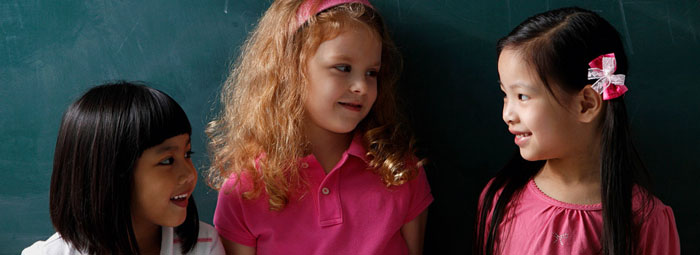The Philosophy of the Montessori School on Child Development

Nearly 100 years ago in Italy, Dr. Maria Montessori, through observation and experimentation, began to work out a set of educational principles which had special application to pre-school children. Soon, Montessori schools were established in Europe, Asia, and the United States.
Briefly, the Montessori approach rests upon these points:
- Very young children experience sensitive periods during which they learn more easily than at an earlier or later time in their lives.
- Children should be introduced to the world of learning through a prepared environment, in which specially designed apparatus and techniques are used to engage the child's mind at a given level of readiness in mastering a variety of tasks.
- Discipline is a point of arrival, not of departure. Inner-discipline cannot be achieved effectively except in an atmosphere of freedom.
The children learn to work by themselves in the prepared environment of the class while enjoying the presence of other children. Their learning tasks center on the use of many materials, which are so designed that they test their understanding and correct their errors at every step in the learning process. The teacher prepares the environment, directs the activity and offers the child stimulation, but it is the child who learns through the motivation that he finds in the work itself.
Objectives
The objectives of the Montessori School of Windsor are to promote the intellectual, the social, the emotional and the physical development of the child.
Intellectual
- Develop concentration
- Acquire a rich vocabulary
- Form mathematical concepts
- Work independently and at his/her own pace and ability
Social
- Respect the rights of others
- Work and play happily together
- Be a leader
- Learn to share
Emotional
- Develop a love for learning
- Develop independence and self discipline
- Develop a positive self-image
- Gain satisfaction from work accomplished
Physical
- Develop muscular skills
- Learn proper use and care of materials
- Develop good habits of safety and health
- Co-ordinate his/her movement
Before and After School
Our Before and After School Program follows the framework of “How does learning happen”. The 4 pillars of “How does learning happen” are Belonging, Engagement, Expression and Well-Being. Teachers practice these pillars by building positive relationships with children and the environment around them. Teachers guide children through healthy development and positive self-esteem. Teachers plan a variety of activities and games that engage children physically and mentally.
"A man is not what he is because of the teachers he has had, but because of what he has done." - Maria Montessori
